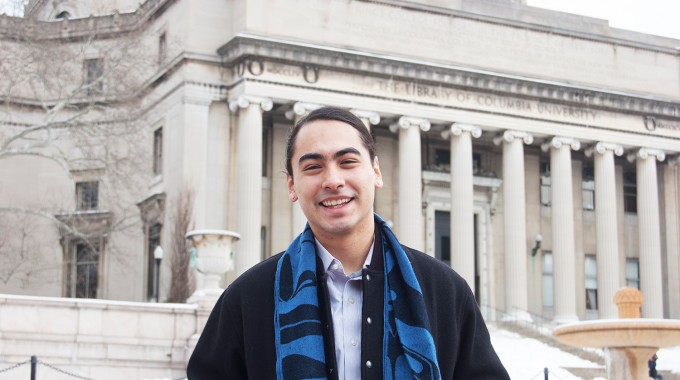If you know of a Columbia College student, faculty member, alumnus/alumna or program we should spotlight, or if you would like to submit a story, please contact:
Columbia College
Office of Communications
cc-comms@columbia.edu

“I want to be someone who inserts Native issues into the conversation.” — Julian NoiseCat CC’15
Julian NoiseCat CC’15 came to Columbia for three main reasons: The Manhattan location — the perfect place to spend one’s early twenties, he said — the promise of learning the Great Books of Western civilization and the unique opportunity to build a Native American community where there wasn’t one before.
“When an admissions officer told me Columbia was looking to build a space for Native students, I knew I needed to be a part of it,” he said.
NoiseCat, a history major, has worked tirelessly to build that space since arriving at Columbia. He spearheaded a movement for a plaque recognizing the Lenape people — the original inhabitants of Morningside Heights — and has published four op-eds in The Columbia Spectator advocating for Native and Indigenous students. In May 2013, NoiseCat worked with administrators to bring Indigenous academic advisors from peer institutions to Columbia to address advising issues, which led to a panel on Native student advising in November 2013. Since then, he has coordinated campus-wide events like Indigenous Peoples’ Day and has helped create a residential community for Native students.
“I took a leadership role and now we have a residential space, called the Manhattan House,” NoiseCat said. “We have an annual powwow and a mentoring initiative through the Office of Multicultural Affairs. We have all these new resources and we have a real community that didn’t exist when I was a freshman, and certainly not five years ago,” he said.
NoiseCat credits student organizations like the Native American Council, for which he acts as president, and Heritage Month for creating a space for Indigenous students to call their own. Using other Ivy League universities like Dartmouth and Stanford — who both have thriving Native student communities — as models, NoiseCat and his peers helped the Columbia community to follow suit.
“It was a whole constellation of people who came here at the same time and really cared about it,” NoiseCat said. “It was getting our fellow classmates and administrators to meditate on what it means to attend a school that’s named after Columbus on an island that is named a Lenape word, and what that means for Native students. It was seeing the potential to have one of the great schools in the world be a place where the Native leaders and professionals of tomorrow come to get educated.”
For his efforts in these endeavors, NoiseCat has received national coverage in Indian Country Today and Yes Magazine. In addition to his advocacy work within the Native community on campus, he is also on the editorial board of the The Columbia Spectator and president and captain of the Men’s Ice Hockey Club. In 2014, NoiseCat was awarded the Milch Prize, as well as the King’s Crown Leadership Excellence Award for “Indelible Mark.”
But he’s not done yet. When he graduates in May, NoiseCat hopes to put Native issues on the radar in the United States progressive political scene.
“In the U.S., most people have no clue about the issues facing Native communities. We’re not on the radar in any sort of way,” he said.
After seeing the living conditions at Canim Lake, an Indian reserve in British Columbia, Canada, where NoiseCat’s father grew up, and living with his single mother in Oakland, California, he is no stranger to the hardship many Native people face.
“Like a lot of Indian reserves, Canim Lake is under-resourced, there’s not enough housing, the water’s not really safe to drink, people live overcrowded, there’s disease and we don’t own our own land; it’s in trust with the federal government,” NoiseCat said. “The situation in the vast majority of Native communities is terrible. They’re the poorest places in the country with the worst health care, police violence, low graduation rates and people die young.”
NoiseCat would like to change these statistics, but first he has to get people talking about it. With the tools he’s learned from Columbia professors, whom he described as “movers and shakers in their fields, but also great teachers,” and support from graduate students along the way, NoiseCat said he has grown exponentially during his time at Columbia and is ready to make an impact after graduation.
“I want to be someone who inserts Native issues into the conversation and makes it possible for my relatives — our people — to live a dignified existence in homelands that have mostly been taken away from us,” he said.
By Jamie Nash
A version of this story appeared on the Registrar's website.